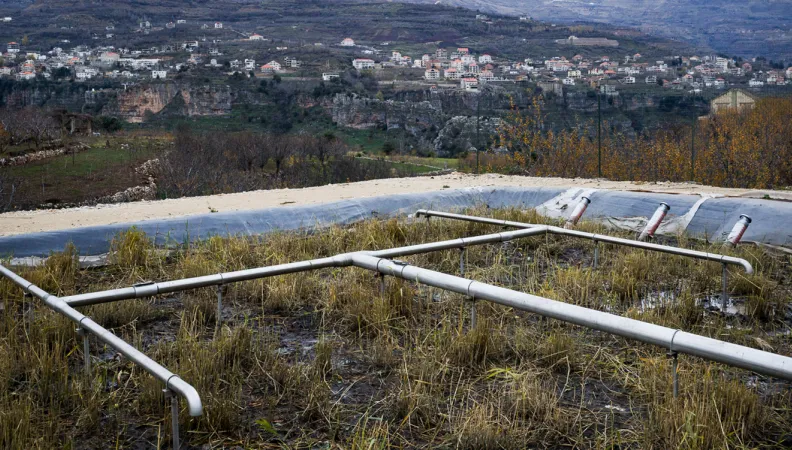Share the page
Public Procurement Reform: "Part of the Solution to Lebanon's Structural Problems"
Published on

Michel Samaha, economist and manager of the Governance and Reforms portfolio at AFD’s office in Beirut, tells us about the public procurement reform process in Lebanon and the role of Agence Française de Développement.
In July 2020, the Lebanese Institute of Finance published the MAPS report, which assesses public procurement systems in Lebanon. With the current economic crisis, this report is the first step in a reform that is essential for obtaining further financial assistance from the IMF and international community. Agence Française de Développement (AFD) and the World Bank (WB) have pooled their expertise and resources to help the Lebanese Institute of Finance prepare this document.
What is special about the MAPS study?
Michel Samaha: MAPS, which stands for Methodology for Assessing Public Procurement Systems, is a comprehensive diagnostic of the way in which public actors (such as administrations, local authorities and public institutions) conduct their procurement processes. The objective is to identify strengths and weaknesses, sources of waste and risks of corruption. This will allow them to move towards a new system compliant with international standards, such as for competitive bidding, transparency, integrity and fairness.
This work has been co-financed by the World Bank and AFD. International independent experts, working closely with Lebanese institutions, including the Basil Fuleihan Institute of Finance (Ministry of Finance), prepared the report, with the participation of civil society.
It has identified shortcomings in the current system and produced a list of recommendations to be implemented in the coming years. The MAPS study has made a detailed analysis of the public procurement system, which is poorly regulated, inefficient and riddled with conflicts of interest in Lebanon.
The publication of this study marks the end of the assessment phase, which, we hope, will lead to an in-depth reform of the body of legislation and an overhaul of the prevailing institutional framework. This “assessment” will inform the ongoing legislative work in parliament for the drafting of a new law. For the moment, this law complies with the main recommendations of the study.
Further reading: Olivier Ray: “In Lebanon, Our Top Priority is to Help the Most Vulnerable”
What are the stakes for Lebanon?
M. S.: Lebanon is facing a multi-sectoral crisis caused by a deficient governance model and ongoing political deadlock, which has prevented the establishment of effective and coherent public policies.
The shortcomings in the public procurement system epitomize the causes and consequences of the failure of Lebanese institutions. In 2019, public procurement amounted to about $3.4 billion, i.e. about 20% of central government expenditure and 6% of GDP. These figures cast into sharp relief a public procurement process whose quality is below the regional average. Indeed, it is considered as being among the most corrupt systems in the world. According to Transparency International, Lebanon ranks 137th out of 180 countries in this regard. Public procurement is marked by an archaic and contradictory legal framework and a lack of open competition, which leaves the way clear for political patronage.
Public procurement reform is at the intersection of the fight against corruption, the effectiveness of public expenditure and support to the private sector. The reform thereby meets citizens’ demands for more transparency in public expenditure management. A serious effort by the authorities could have structural benefits for the country’s economy and institutions. The involvement of Lebanon’s civil society would be a further indication of the Lebanese Government’s commitment to strengthening its accountability to its citizens.
Public procurement reform could also be the driving force behind reshaping Lebanon’s economy towards a model that is more balanced and sustainable over the long term. This was a cornerstone in the design of the CEDRE conference in 2018. The reform is addressing issues related to corruption, respect for the rule of law and institution building, which requires improving a business climate that is currently unattractive for investors.
Such reforms can also contribute to the transition from a rentier model to a productive and competitive economy.
For all these reasons, France, via AFD, will allocate technical and financial resources to assist the Lebanese authorities’ efforts to ensure this reform is successful.
Further reading: Solidarity with Lebanon: France Calls for Donations
What is AFD’s role in this reform?
M.S.: AFD has been involved in this reform project since 2018, through a close partnership with the World Bank. This has required a careful monitoring of the project’s progress and an analysis of power relations in order to form a coalition to drive structural change.
Even under the best auspices, the passage of this law is just the starting point for a long-term reform. Beyond the texts, the administration’s entire way of managing its procurement needs to be changed: create an independent regulatory authority, conduct regular audits to identify weaknesses, train public purchasers and build an online procurement system to facilitate procedures.
To this end, the law will need to be set out in a multi-year action plan, with the creation of an interministerial committee responsible for its implementation. These projects are complex and will require the mobilization of the international community to assist and support the Lebanese Government’s efforts.
AFD will continue to work actively until the completion of this reform: a technical cooperation project is under preparation with the Regional Economic Service at the French Embassy to ensure the sustainability of this reform and its ownership by all the actors (such as ministries, local authorities, the Court of Auditors and the private sector).
